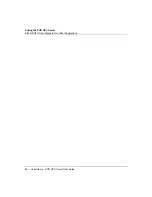
4 Overview of Uniformance PHD
4.5
Read/Write Access to PHD Data
Uniformance PHD OPC Server User Guide
•
43
4.5 Read/Write Access to PHD Data
Uniformance client applications access the PHD Server to obtain current and historical values
from the archival database. These clients use an application interface provided by
Uniformance PHD. In addition, these clients may also request specific data reductions to be
performed, such as average and standard deviation.
The ability to read or write values of a PHD tag is controlled by a PHD tag security
configuration for each tag in the PHD Server database.
You can restrict access to a PHD tag to specific users.
You can configure values written to PHD to be forwarded to the DCS.
4.6 Introduction to PHD Security
You administer PHD security through the Uniformance PHD Configuration Tool application
(previously named TPI) – it enables you to configure individual users and their access rights
.
You control PHD security through the configuration of security attributes in the PHD
database, enabling or restricting access to PHD data and functions on a per user basis. The
security configuration is based on the definition of users and roles.
A user is configured in PHD with a name and password used to connect or log on to the PHD
system. Once configured, the user becomes an authorized client of the server.
Roles specify the level of access available to a user after they connect to the server. Access is
granted to a PHD configurable object of the following types:
−
a Tag (that is, a point.variable),
−
a Real-time Data Interface (RDI), or
−
a Function.
A user's access right to each configurable object in the PHD database (Tag, Interface, and
Function) may be granted by a Role. A role is a configuration entity in PHD, reflecting the set
of privileges that may be assumed by a given user on an object. The basic privileges that may
be granted are Read, Write and Configure.
For example, you can define a role that enables the user to write values to tags configured in
PHD. You can assign this role to individual PHD Tags, or to an RDI that in turn has
numerous tags assigned to it. A user with this role can write data to a tag with the same role.
However, the ability to write data to a tag in PHD, and to the data source, such as the DCS, is
restricted by additional configuration options on each individual tag.
Summary of Contents for Uniformance R300
Page 1: ...Uniformance PHD OPC Server User Guide R300 ...
Page 6: ...Support and Other Contacts vi Uniformance PHD OPC Server User Guide ...
Page 10: ...1 About This Document 1 3 Additional References 10 Uniformance PHD OPC Server User Guide ...
Page 60: ...Honeywell Process Solutions 1860 W Rose Garden Ln Phoenix AZ 85027 2708 USA ...
















































